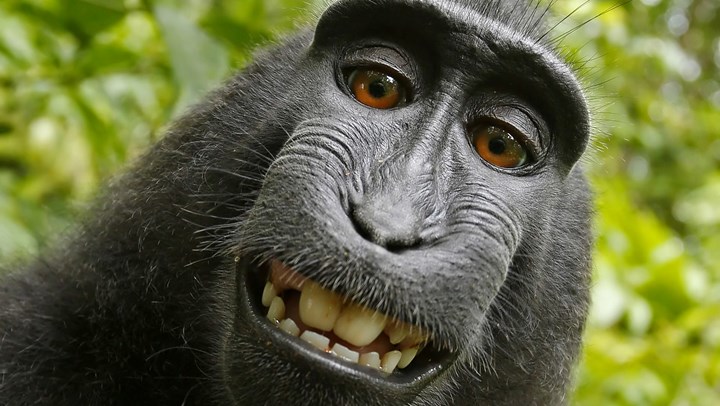
by Karen Mehall Phillips - Wednesday, September 13, 2017

Remember hearing about the outrageous lawsuit brought by anti-hunting extremist group PETA (People for the Ethical Treatment of Animals) in 2015? Oh, I need to be more specific? I’m referring to the suit PETA filed against a British photographer after a monkey used his camera to snap a selfie. PETA, being PETA, sued on behalf of the monkey, saying the animal owned the copyright because it was the “author” of the photo. Then, in a sudden turn of events, the photographer, who had mounting legal bills to face, offered to settle the two-year lawsuit earlier this week amid review by the Ninth Circuit Court of Appeals in California. For PETA, convincing an appellate judge panel that a monkey should own the copyright was quite the difficult idea to sell, and settling still meant considerable editorial and social media coverage for its ongoing personhood-for-animals quest. In return, the photographer will donate 25 percent of the photo’s future sales to charities dedicated to the species’ conservation.
It all began in 2011 when photographer David Slater was on assignment in Indonesia and a crested macaque took his camera and snapped the shutter. Wikimedia Commons, the online repository of free-use images, uploaded Slater’s photos as royalty-free images in 2012. For months Slater asked the website to either remove them or pay for them, but it said he did not own the copyright because he did not take the photos. In 2014, Slater told BBC News that he’d lost a huge amount of revenue on photo sales to date. Eventually Slater published the pictures in a book, and that’s when PETA pounced. In 2015, despite that the U.S. Copyright Office said animals cannot own a copyright, PETA filed a lawsuit in federal court in San Francisco to have the monkey “declared the author and owner of his photograph,” claiming that all proceeds from photos should benefit the monkey.
The court disagreed. In 2016, as noted by UPI and numerous other media sources, U.S. District Judge William Orrick of the Northern District of California struck down PETA's argument claiming that a selfie taken by a monkey is that monkey’s intellectual property. Orrick ruled that the case for an animal's ownership of a copyright was indeed a “stretch.”
But PETA challenged the ruling, taking the case to the Court of Appeals. It claimed the monkey they called Naruto was the author of the works "in every practical (and definitional) sense." But even the identity of the monkey was in question. According to the U.K.-based online men’s lifestyle magazine ShortList.com, Slater argued in court that PETA had not even identified the correct macaque. “I know for a fact that [the monkey in the photograph] is a female and it’s the wrong age,” he said. “Surely it matters that the right monkey is suing me.”
PETA's Questionable Diversion of Funds
ShortList.com also noted PETA’s “seriously questionable diversion of funds” as it spent years destroying Slater’s credibility and bank account, also noting the effect it was having on his 7-year-old daughter.
“I can’t afford to own a car. There’s no camera equipment for her to inherit if I die tomorrow,” Slater said at the time. “She should inherit this [copyright], but it’s worthless.”
And from a conservation standpoint, in an interview with the U.K’s Telegraph in July, Slater said, “Everything I did to try and highlight the plight of the monkeys has backfired on my private life. I've had my life ruined.”
But now Slater’s fight is over. And while the settlement announcement states that he will donate 25 percent of any future revenue earned from the image, Short.List.com notes “at least 75 percent is 100 percent better than the zero he was threatened with being entitled to.”
But as NRA-ILA Director of Conservation, Wildlife and Natural Resources Susan Recce points out, “While PETA lost its lawsuit, it is unfortunate that the case was settled while being reviewed by the Ninth Circuit, which might have shut the door on the personhood-for-animals concept completely. Online headlines like ‘British Photographer Wins Court Battle over Monkey Selfie’ are good news but remember that the photographer still had to pledge to donate 25 percent of future photo sales. Or maybe Slater was just doing what he could in the name of conservation of the species as he closed the book on another PETA attempt to distort the facts.”
But to Recce’s point, while the costs of continuing the lawsuit were steep, Slater already had won in the lower court and the appeals court was reviewing the case. Slater’s outlook was certainly positive, despite PETA’s work to have animals declared sentient beings as a matter of law. Fortunately, common sense continues to hold its ground on such issues as mainstream Americans—hunters and non-hunters alike—recognize such thinking as being adverse to the laws of nature.
E-mail your comments/questions about this site to:
[email protected]
Proudly supported by The NRA Foundation and Friends of NRA fundraising.
